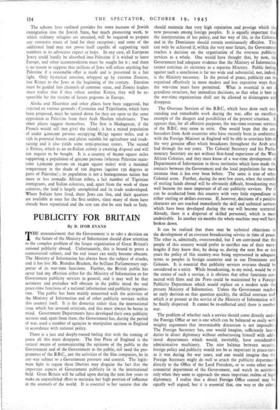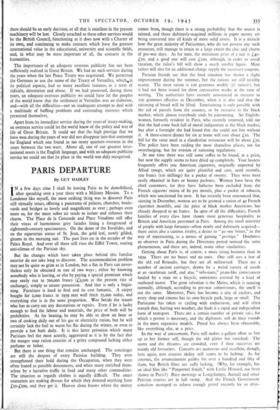PUBLICITY FOR BRITAIN
By B. 1FOR EVANS
THE announcement that the Government is to take a decision on the future of the Ministry of Information should draw attention to the complex problem of the future organisation of Great Britain's national publicity abroad. Unfortunately, this is bound to prove a controversial subject, and the real issues can easily become obscure. The Ministry of Information has always been the subject of attacks, and it has lost Mr. Brendan Bracken, the brilliant Parliamentary sup- porter of its war-time functions. Further, the British public .has never had any affection either for the Ministry of Information or for Government publicity services in general, and it may well be that acrimony and prejudice will obscure in the public mind the real peace-time functions of a national information and publicity organisa- tion. The public has been mainly concerned with the activities of the Ministry of Information and of other publicity services within this country itself. It is the domestic rather than the international issue which has aroused criticism, and this must always be borne in mind. Government Departments have developed their own publicity sections and, apart from these, the Government has, during the period of war, used a number of agencies to manipulate opinion in England in accordance with national policy.
There is a just and deeply-rooted feeling that with the coming of peace all this must disappear. The free Press of England is the natural means of communicating the opinions of the public to the Government and of the Government to the public, riot need the pro- grammes of the B.B.C., nor the activities of the film companies, be in any way subject to a Government pressure and control. The legiti- mate fight to regain these liberties may disguise the fact that the important aspects of Government publicity lie in the international field. Great Britain will be called upon during the next few years to make an unparalleled effort to maintain her high position Of influence in the counsels of the world. It is essential to her success that she
should maintain that very high reputation and prestige which she now possesses among foreign peoples. It is equally important that the interpretation of her policy, and her way of life, in the Colonies and in the Dominions should remain continuously effective. This can only be achieved if, within the very near future, the Government reaches a decision on the organisation of the overseas publicity services as a whole. One would have thought that, by now, the Government had adequate evidence that the Ministry of Information cannot continue its existence as a separate Ministry. Public feeling against such a conclusion is far too wide and substantial, nor, indeed, is the Ministry necessary. In the period of peace, publicity can be organised effectively in more modest and less expensive ways than the war-time years have permitted. What is essential is not a grandiose structure, but immediate decisions, so that what is best in the war-time organisations shall not be allowed to disintegrate and disappear.
The Overseas Services of the B.B.C., which have done such out- standing and remarkable work during the war, offer an excellent example of the dangers and possibilities of the present situation. It appears that, for all effective purposes, the war-time overseas services of the B.B.C. may cease to exist. One would hope that the am- bassadors from Arab countries who have recently been in conference with the Foreign Minister in England will be able to convince him of the very genuine effect which broadcasts throughout the Arab area had through the war years. The Colonial Secretary and his Parlia- mentary Secretary are not without first-hand experience of the West African Colonies, and they must know of a war-time development of Departments of Information in those territories which have made the contacts between the Government and the local populations far more intimate than it has ever been before. The same is true of other Colonial areas. Further, during the next few years, when the transfer of sterling funds abroad will be obviously difficult, broadcasting may well become the most important of all our publicity services. For it can be conducted from this country with very little expenditure in either sterling or dollars overseas. If, however, decisions of a positive character are not reached immediately the skill and technical services which have been developed during the war will become scattered. Already, there is a dispersal of skilled personnel, which is most undesirable. In another six months the whole machine may well have broken down.
It can be realised that there may be technical objections to the development of an overseas broadcasting service in time of peace. The ether is, admittedly, overcrowded, but I am convinced that the people of this country would prefer to sacrifice one of their wave- lengths if they knew that, by doing so, during the next five or ten years the policy of this country was being represented in adequate terms to peoples in foreign countries and in our Dominions and Colonies. It is essential that publicity services overseas should be considered as a unity. While broadcasting, to my mind, would be at the centre of such a service, it is obvious that other functions con- nected with films and the Press could be maintained by a Foreign Publicity Department which would replace on a modest scale the present Ministry of Information. Unless the Government reaches an early decision on that question quickly, the skilled overseas staff which is at present at the service of the Ministry of Information will be finally dispersed. It cannot be re-collected until there is another war.
The problem of whether such a service should come directly under the Foreign Office or not is one which can be balanced so easily with weighty arguments that interminable discussion is not impossible. The Foreign Secretary has, one would imagine, sufficiently heavy duties in direct diplomacy without embarrassing himself with addi- tional departments which would, inevitably, have considerable administrative machinery. The nice balance between security, foreign policy and publicity would not be as important in peace-time as it was during the war years, and one would imagine that the Foreign Secretary might do well to attach the publicity department directly to the Office of the Lord President, or to some other non- committal department of the Government, and watch its activities only when they seem to approach the more important realms of high diplomacy. I realise that a direct Foreign Office control may be equally well argued, but it is essential that, one way or the other.
there should be an early decision, or all that is excellent in the present machinery will be lost. Closely attached to these other services would be the British Council, functioning as it does now with a Charter of its own, and continuing to make contacts which have the greatest international value in the educational, university and scientific fields, and, in what may be most important of all, the contacts in the humanities.
The importance of an adequate overseas publicity has not been sufficiently realised in Great Britain. We had no such services during the years when the last Peace Treaty was negotiated. We permitted the Germans to use the name of the Treaty of Versailles, which.in its political aspects, had so many excellent features, as a term of ridicule, detestation and abuse. If we had possessed, during those years, an adequate overseas publicity we could have let the peoples of the world know that the settlement at Versailles was an elaborate, and—with all the difficulties—not an inadequate attempt to deal with a multitude of baffling problems and contending interests which presented themselves.
Apart from its immediate service during the years of treaty-making, an overseas service could let the world know of the policy and way of life of Great Britain. It could see that the high prestige that we have won during the years of war did not disappear into that contempt for England which one found in too many quarters overseas in the years between the two wars. Above all, one of our greatest inter- national assets is the English language, and with an adequate publicity service we could see that its place in the world was duly recognised.



























 Previous page
Previous page